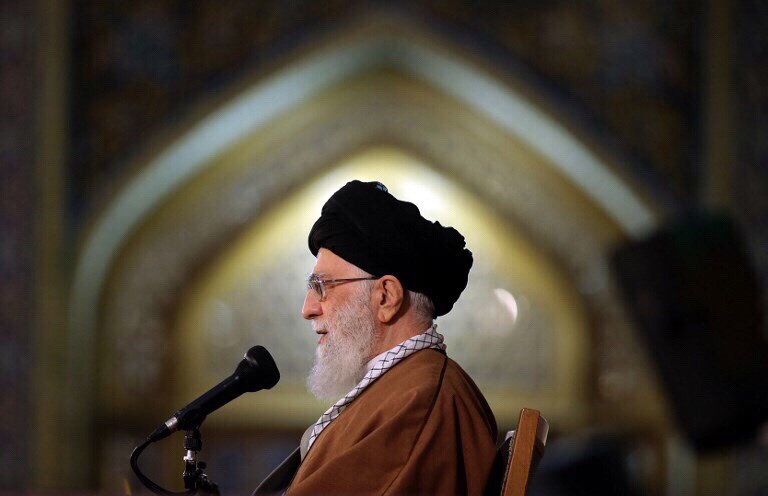 Defiant Khamenei emphasizes Iranian regime’s aggressive policies
Defiant Khamenei emphasizes Iranian regime’s aggressive policiesSupreme leader Ayatollah Ali Khamenei addresses crowds of Iranians in the northeastern holy city of Mashhad for a celebration of Nowraz. (AFP)
Every year, Iranian Supreme Leader Ali Khamenei delivers a few speeches, with the annual address in Mashhad, a city in northeast Iran, considered to be the most important.
It is imperative to meticulously examine the points made by Khamenei in this speech, which is delivered after the Persian New Year. The comments by the most powerful man in Iran outline the path the Islamic Republic will take in the next year.
Iran’s lawmakers in the Majlis (parliament) and military generals view Khamenei’s annual speech as direct instructions to be followed. Policymakers should also search for the important issues that Khamenei deliberately and shrewdly evades.
In his most recent annual speech, which he gave on March 21, Iran’s supreme leader highlighted several important issues. First of all, he went on at length to explain that the Islamic Republic ought to maintain its core revolutionary principle of opposing Western countries.
Intriguingly, Khamenei did not make any distinction between the US and European countries in this year’s speech. After the Joint Comprehensive Plan of Action (JCPOA), commonly known as the Iran nuclear deal, was reached between six world powers and the Islamic Republic, Iran’s supreme leader employed a softer tone toward the European nations in his annual speeches.
The main reason behind Khamenei’s shift this year is the fact that European countries have been incapable of assisting Tehran in bypassing the renewed US sanctions. After the Trump administration reimposed the primary and secondary sanctions that had been lifted or waived under the nuclear deal, both American individuals and companies and non-American entities could be punished for continuing to trade and have business dealings with the Iranian government. Many European firms and corporations, including French energy giant Total, subsequently abandoned their plans to invest in Iran.
As a result of this move, Khamenei’s main military institutions, including the Islamic Revolutionary Guard Corps, its elite Quds Force branch, and Iran’s militia and terror groups, which were the main beneficiaries of the increased cash flow following the nuclear deal, witnessed a significant drop in their income.
The supreme leader was initially hoping that the EU would come to his aid. However, as Hassan Rouhani’s government searched for assistance from European governments in helping Tehran increase its revenues and trades, the Islamic Republic soon realized that the EU’s projects and mechanisms, such as INSTEX — the Instrument in Support of Trade Exchanges — were totally ineffective.
This is why Khamenei ridiculed the EU, stating: “This financial channel they recently set up resembles a joke, a bitter joke… Europeans should have stood up to the US after it left the JCPOA and should have lifted all sanctions against Iran.”
But European companies will not risk their business with the US or access to the US financial systems by dealing with Iran.
Khamenei demonstrated escalating antagonism toward those state or non-state actors that his regime views as enemies
Dr. Majid Rafizadeh
The second critical comment that Khamenei made was linked to deploying more hard power, rather than diplomacy and soft power, for carrying out domestic and foreign policies. He emphasized that the country’s military infrastructure ought to be advanced.
His move is in clear defiance of the international community’s pressure on Tehran’s military adventurism and advancement of its ballistic missile program. Khamenei pointed out that: “We shall continue to strengthen our military power in spite of the enemies and will not relent under pressure.”
In addition, Khamenei demonstrated escalating antagonism toward those state or non-state actors that his regime views as enemies and rivals. For example, he lashed out at Saudi Arabia and further incited anti-Western sentiments. He referred to Western politicians as savages. “Deep inside, Western politicians are savage individuals in the true sense of the word. You should not be surprised at this. They wear a suit, they wear a tie, they put on perfume and they carry a Samsonite briefcase, but they are savages and they act in a bestial manner in practice,” he said.
Iran’s supreme leader did not take responsibility for the most important issue in Iran: The economic difficulties and challenges that many Iranians are facing on a daily basis. He blamed the West for the nation’s economic crisis and labeled the coming year as one “of opportunities, possibilities and openness” and a year for “boosting production.”
How can the Iranian people regard the new year as a “year of opportunities” and “boost production” when the country’s leaders have not taken any concrete steps to address the regime’s financial corruption, misuse of public funds and the widespread banking crisis, which are among the major reasons behind the present currency and economic crises? In fact, these problems are systemic and exist deep in Tehran’s economic infrastructure.
Khamenei made it clear in his important speech that he is determined to defy international norms and standards, continue to expand the stranglehold of his military institutions, further destabilize the region, and evade responsibility and accountability for Iran’s economic crisis.
• Dr. Majid Rafizadeh is a Harvard-educated Iranian-American political scientist. He is a leading expert on Iran and US foreign policy, a businessman and president of the International American Council. Twitter: @Dr_Rafizadeh
Disclaimer: Views expressed by writers in this section are their own and do not necessarily reflect Arab News’ point-of-view
No comments:
Post a Comment